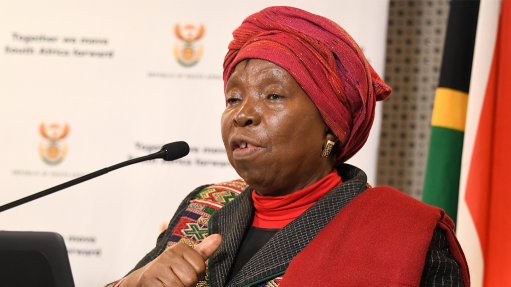
Cogta Minister Nkosazana Dlamini-Zuma
Cooperative Governance and Traditional Affairs Minister Nkosazana Dlamini-Zuma has detailed the country's new Covid-19 rules under Level 2.
She reminded South Africans the "risk-adjusted strategy" had been implemented on 21 April - allowing for a gradual opening up of the economy, but it had remained necessary to "walk a tightrope" between "saving lives and livelihoods".
Dlamini-Zuma said the Covid-19 numbers now "appear to be stabilising", and there was a "noticeable decrease" in numbers in several provinces.
She added there was also now "sufficient hospital capacity", including ICU and ventilators and as a result, the national government had ordered a temporary suspension of building more field hospitals.
The government had decided the time was now right to "alleviate hardships" and end prohibitions.
This included the legalisation of the sale of alcohol from Monday to Thursday between 09:00 and 17:00. This will permitted at off-sales, as well as licenced restaurants, bars and taverns.
Dlamini-Zuma said a maximum number of 50 patrons were permitted, and they had to observe health and safety protocols.
Another prohibition to end was on water-based activities - including tourism services, such as boat-based whale watching, shark-cage diving and other tourism activities, plus water sports, including kayaking.
Alcohol
On the consumption of alcohol, Dlamini-Zuma warned: "Let us drink responsibly."
And, in particular: "When we have been drinking … if you are drunk, don't drive."
Equally, when people, who had been drinking returned home, she urged them not to "abuse women and children's rights" or "pick fights".
Some curtailments remained in place, including the curfew - from 22:00 to 04:00 - and the ban on international travel, cruise ships and watching sporting events.
And nightclubs remained closed because international experience had showed the virus spread "as fast and as energetically" as those on the nightclubs' dance floors.
Dlamini-Zuma concluded by thanking all South Africans, urging: "We must not tire. We must take it as a way of life now."
An example was the use of masks by the Chinese, for many years prior to the Covid-19 pandemic. South Africans should adopt the use of masks permanently.
She warned South Africans the government had not ruled out re-issuing any of the bans - or returning to stricter alert levels.
Tobacco
In the questions and answers session after her initial announcements, Dlamini-Zuma was asked if there would be any restrictions around the sale of tobacco products. She answered: "Tobacco will just be sold - there are no particular restrictions on it, unlike alcohol.
"Part of the reason is that … the reason tobacco was banned was that if you are a smoker, for quite some time, and you get Covid-19, it goes into the lungs and the respiratory tract … there was evidence coming from other countries that smokers would tend to have a more serious disease - requiring ICU beds and respirators."
She continued: "When you stop smoking do show pretty quickly. So your respiratory track does improve quickly and your general well-being does improve.
"That's why it was prohibited temporarily."
But now there was sufficient hospital capacity, including ICU beds and ventilators. So the restriction on tobacco sale could be legalised.
But Dlamini-Zuma warned the same was not true of alcohol: "People drink, they drive, they fight.
"And we've seen literally, how during lockdown, car accidents, trauma units were emptying when alcohol was not allowed… And how it went up - when alcohol sales had resumed.
"So then to just open completely stands a risk of the surge coming back and overwhelming the health service. That's why it was agreed that we start slowly."
Asked how the police could hope to restrict private home visits to 10 people or less, Dlamini-Zuma commented: "The vast majority of South Africans are law-abiding citizens … they don't need to be policed for every activity."
The limit of 10 people gathering in private homes was "not for the sake of government - but for their own sake, the sake of their families, and the sake of their communities".
"And, in particular, to prevent the spread to elderly people."